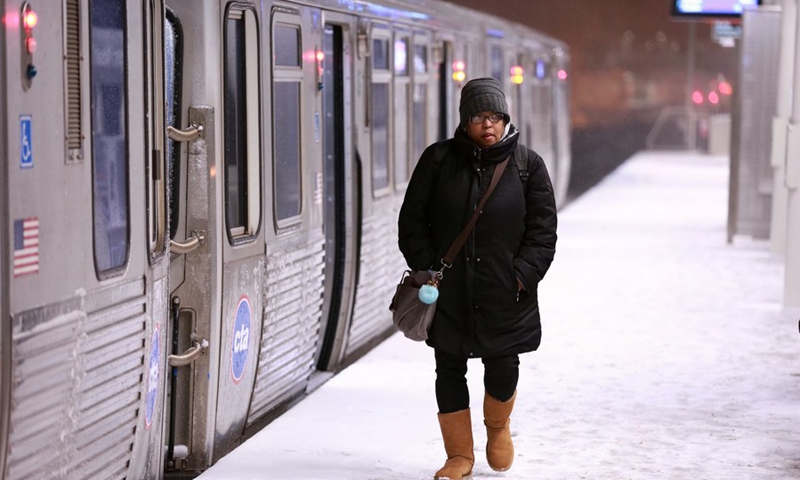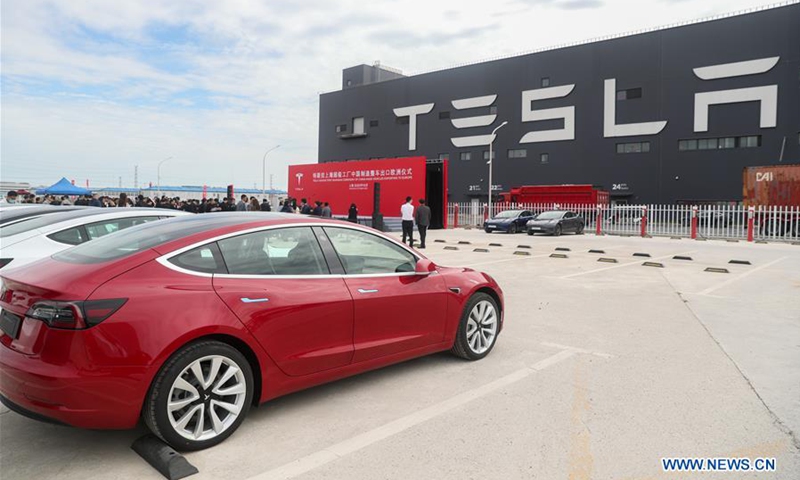Only a US domestic revitalization plan that can forget about China will have any promise
-When developing infrastructure, the internal driving force of society should be far greater than the resistance from interests. But this is not the case in today's US: Editor-in-Chief Hu Xijin-

A woman walks at a platform of a subway station in Chicago, the United States, January 17, 2020. Photo: Xinhua
US President Joe Biden unveiled a roughly $2 trillion American Jobs Plan focused on infrastructure and the climate crisis in a speech in Pittsburgh on Wednesday. To win support, he said that the "once-in-a-generation" investment would "put [the US] in a position to win the global competition with China in the upcoming years."
.
Much of infrastructure in the US has been old. Both Democrats and Republicans are on the same page on this matter. US former president Barack Obama in September 2010 proposed his ambitious plan to renew the US' transportation infrastructure, but failed to achieve it in both of his terms. Neither did Donald Trump. Biden launched the third round of such attempt. His plan contains the greatest details and seems to be the most serious one.
.
However, the Biden administration's infrastructure plan was met with opposition from Republicans when it was announced. Trump slammed the infrastructure plan as a "giveaway to China" in a statement on Wednesday, and said that the proposed tax increases designed to fund the $2 trillion proposal would end up backfiring by sending American jobs overseas. Biden may once again have mired himself down in a situation where everyone agrees that it was the right thing to do, but no one can agree on how to do it or where the money will come from.
.
US society has been gravely divided. The more interests involved in carrying out a big plan, the more opportunities for political struggles to be created, which will hinder the goal to be achieved. This is the root of the US' problem. To engage in infrastructure construction, the internal driving force of society should have been far greater than the resistance from disputes by different interest groups, but this is not the case in the US. Exploiting "defeating China" as a thrust to push the plan sharply deviates from the appropriate track. This makes the plan hard to achieve.
.
Has China ever thought of competing with the US as it builds high-speed trains, widen the highway network and build network base stations? They are entirely China's own national agenda. The incentive to invest is strong, and the general public is very supportive. We can say that China's infrastructure advances with ease. Our concern is often that we should not work lavishly on these projects in case they lead to interim waste or debt.
.
The US now has China everywhere in its mind with regard to its domestic policy, attaching labels of national security randomly, and blaming China for any industrial imbalance in the US. Apart from instigating nationalism, this would do little to solve the problem. Over time, the US will not only be down with an anti-China syndrome and strike at anything Chinese, but will also only be able to make its policy with anti-China elements. This will lead to the misdirection of its goal time and again and cause it lose its way in development.
.
The US should force itself to forget about China more often. What the US needs to do is struggling with itself. It has been more than a decade since it has called for the construction of the high-speed railway. Why hasn't a single kilometer been built? What does this inefficiency have to do with China? Trump overturned many of Obama's policies and now Biden overturned Trump's policies. Is this what China seduced the US to do?
.
It is quite impressive that Washington is beginning to value some important lessons from China. Conflict is also a way to learn from each other. China's key experience is to mind its own work well. Biden's determination to improve infrastructure and increase investment in technology seems to have taken something from China's direction. We hope that the US could adhere to this idea. It is the right way forward.
.
If the US really initiated a new investment in infrastructure, it is believed that Chinese society in general will be optimistic about its success. More of this kind of engagement by the US will increase its market demand, which is a positive factor in the expansion of China's economic growth. After all, the contest between China and the US should have been focused on the competition of domestic development, rather than playing chess on the diplomatic front.
.
If Washington had refocused its attention, it might not have exaggerated the "China threat" theory as much as it does now. They will find that the benefits of China-US cooperation may outweigh the zero-sum competition with China "from a position of strength." China could be a partner, not a rival, in Biden's plan to revitalize US infrastructure, if Washington so desires.
.
Obsessive focus on making enemies or confrontation is narrow-minded and an exhausted strategy. It is an unwise one. This is true of a person, and it is also true of a country
.
Source link.
Related:
Washington's elaborate encirclement of China has been blown to a hideous mess just by China's normal exchanges with
China and ASEAN are going to overcome challenges like COVID-19 and seek solutions for regional problems like the ..
Related posts:
People march in downtown Montreal, Canada during a demonstration against anti-Asian racism on March 21, 2021





